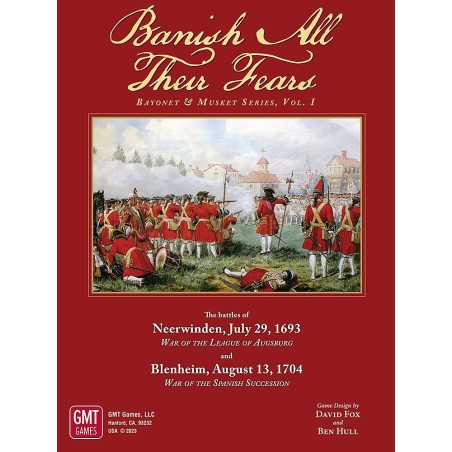













 Security guarantees
Security guarantees
100% secure payments: PayPal, Visa, MasterCard, bank cards, alternative payments.
 Delivery policy
Delivery policy
Deliveries by Mondial Relay or Colissimo (French fast postal service).
 Returns policy
Returns policy
Returns accepted up to 14 days after delivery
- Neerwinden, July 29, 1693, War of the League of Augsburg. Outnumbered and thoroughly out-maneuvered by the French army under the Duke of Luxembourg, British King William III refuses to retreat his Allied army over the river to his rear and instead elects to defend a stout breastwork line strongly anchored on fortified villages. Luxembourg has the cream of the French army at his command, and sees an opportunity to break the enemy defenses and possibly destroy the Allied army.
- Blenheim, August 13, 1704, War of the Spanish Succession. Facing defeat in Spain, northern Italy, and along the Rhine, the Duke of Marlborough leads his Allied army deep into Bavaria and threatens to remove that key French ally from the war. The French respond by sending an army under Marshal Tallard that links up with the Bavarians under Elector Max Emmanuel and stands to face Marlborough near the village of Blenheim on the banks of the Danube.
The development of the flintlock musket and socket bayonet was one of the great revolutions of military technology. Early flintlocks appeared as far back as 1610; by the 1670's they were found more frequently in infantry arsenals, and their superiority over the slower, more cumbersome matchlock led to their adoption by western European militaries by 1695. The parallel invention of the socket bayonet, which attached to the exterior end of the barrel and allowed the musket to be fired with fixed bayonet, saw the end of the pike as anything except a badge of rank for NCO's. The foot soldier had thus completed his long journey from the ancient deliverer of shock to the modern bearer of firepower.
The BAYONET & MUSKET series will cover the period of the War of the League of Augsburg, 1688-1697, and the War of the Spanish Succession, 1702-1714. In western Europe, the figure of the great King of France, Louis XIV, dominated the scene, leading a newly united and energetic France to expand and secure its frontiers into Germany, Spain, northern Italy, and the Spanish Netherlands, a course which ran into the natural opposition of Great Britain, the Holy Roman Empire, and the Dutch United Provinces.
Larger national armies, reinforced by a multitude of German allies and hired troops, far exceeded anything seen before in Europe; the battles of Steenkirk (1692) and Malplaquet (1709) were the largest fought on the continent before the coming of Napoleon. Great generals emerged on both sides-- for the French, the Duke of Luxembourg and the Duke of Berwick and the Marquis du Vauban, one of the greatest of all military engineers. Against them came the Imperial Prince Eugene of Savoy, and the finest commander of the age, the Duke of Marlborough.
Larger armies and the primacy of firepower mean significant changes for the familiar Musket & Pike game system:
- Larger armies. Brigades became the primary battlefield maneuver element, and while retaining foot battalions and horse regiments as our unit scale, we've made brigades paramount. Shifting brigades between wings and committing them into action to take advantage of enemy mistakes was the essence of victory for the great commanders of the age, and we've built that into the game.
- Supremacy of firepower. Combat has been streamlined and simplified so that most unit combats are now resolved in 1 - 2 die rolls with decisive results. Players will soon learn the importance of creating and using fresh reserves to bolster their shot-up frontline battalions.
- Solid map and OOB research. Nothing new here, the consistently high level of historical research that went into maps and OOB's in the Musket & Pike series continues.
Game Scale
1 Hex = 200-220 yards / 190 – 210 meters
1 Turn = 20 minutes
Infantry Units are battalions of 500-600 men
Cavalry Units are 2 to 3 squadrons of 250-350 men
Artillery Units are batteries of 8-10 guns
Complexity is Moderate
Solitaire Compatibility is Medium (no hidden movement, no reaction movement)
Sequence is by alternating by brigade within based on orders (Charge, March, Dress Ranks)
COMPONENTS
1 X Rulebook
1 x Playbook
1 x Two-sided 34x22 map
5 x Two-sided ¾ inch counter sheets
1 x Two-sided Command Display
4 x Player Aid Cards
1 x Single-sided Time Card
2 x 10 Sided Dice